The Pros and Cons of Aging in Place
A complete overview of the good and bad sides of aging in place.

The Pros and Cons of Aging in Place
A complete overview of the good and bad sides of aging in place.
Aging in place has become a staple of retirement for many Americans, representing the ultimate retirement dream.
93% of adults 55+ believe it's an important goal.
Aging in place is the act of remaining in one's home as one grows older. And by 2034, those 65+ will outnumber those under 18, meaning aging in place will continue to become a more significant trend.
However, as with every decision, it's vital to understand the drawbacks and advantages of aging in place. Understanding this will empower you to make the proper decision based on your needs, preferences, and situation.
The Drawbacks of Aging in Place

Uncertainty About Stability
Stability is vital to age in place properly. That means having the financial, physical, and emotional health to survive independently. Unfortunately, those three factors can change anytime, leaving you vulnerable to adverse effects.
This applies to you and a significant other you may rely on. Should their health turn for the worse, it can leave you blindsided.

Increased Health Risks from Age
As we age, we become more prone to health risks. It's been found that 94.9% of adults 60+ have at least one chronic health condition. And being alone to deal with can be challenging. It can leave you vulnerable and unprepared should you need home modifications to counteract a condition.

Social Isolation
One-third of adults 45+ report feeling lonely.
While living at home gives you privacy, said privacy can lead to loneliness. Social isolation can lead to feelings of depression when not dealt with properly. Because of this, it's vital to seek outlets for frequent interaction with others.
For more information and tips on living alone in old age, we recommend our guide on How to Prepare for Old Age Alone
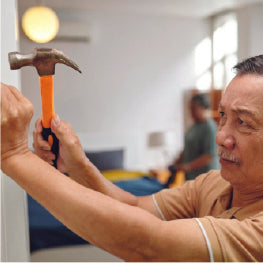
Home Modifications
It's been found that only 10% of homes are aging-friendly.
You'll likely have to modify your home to make it safe and accessible. While every case is different, these costs can quickly add up if you're unprepared.

Home Maintenance
While home ownership can be a blessing, it can become a curse if you can’t keep up with maintenance. As you grow older, you may struggle to perform everyday tasks such as lawn mowing, cleaning, and replacing items. If you have the financial means, this can be sufficed by hiring professionals to keep up with the needs of your home.
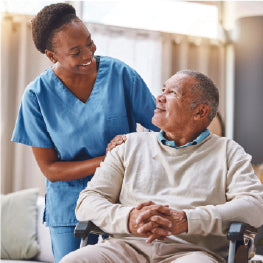
Costs of Home Health Care Services
Home health care services can include various services such as cleaning, transportation, personal care, and technology assistance. And while these are more affordable than long-term care, they can add up if your needs are extensive. It's been found that the median hourly rate for home care aids is $27.

Burden on Caregivers
While relying on family members to care for you is an affordable option, it can lead to caregiver burnout, a state of emotional, physical, and mental exhaustion. It's usually caused by extended stress from the responsibilities of a family caregiver.

Transportation
One area that older adults tend to struggle with is driving themselves. The cumulation of vision impairment and cognitive decline can make driving dangerous for seniors. The CDC found the rate of drivers 65+ involved in fatal crashes per mile driven to be more than twice the rate of drivers 35-44.
Because of this, it's vital to have alternative methods of transportation.
The Benefits of Aging in Place
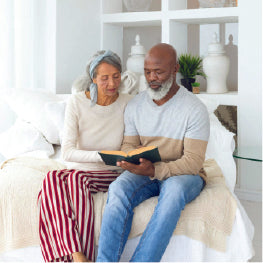
Comfort and Familiarity
One of the many draws of aging in place is the comfort and familiarity that one's home has. Unlike assistive living facilities, home brings the comfort of memories and personal belongings. This is a vital aspect of self-identity and independence. Having to start over late in life can be uncomfortable and stress-inducing.
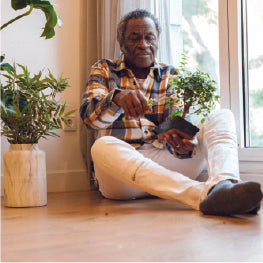
Convenience of Personal Belongings
When we're at home, we're surrounded by our personal belongings. We know where they are and can easily get to them. This convenience can be a primary key to quality of life. It creates autonomy and flexibility that alternatives don’t. This can feed into the benefit of independence.

Cheaper, Individualized Care
Home health care is often more cost-effective and personal than those provided in senior living communities. Home health aids will come to your house, provide you with a custom care plan, and do it at a much more affordable cost than alternatives.
By aging in place, seniors avoid the monthly fees and entrance costs often associated with assisted living and nursing homes. Programs like Medicaid Home and Community-Based Services might also help with in-home care costs.

Affordability
The alternative to aging in place ranges from $3,000 to $13,000 monthly. And while home modifications and health care costs vary, they're typically much more affordable. A survey found that 43% of older adults choose to stay in their homes because they're not confident they can afford assisted living expenses.
The process alone of moving can bring fluctuations in costs. This ambiguity can create financial stress, whereas aging in place is much more predictable. Because of their longevity in their home, seniors already know the costs and potential future costs required.
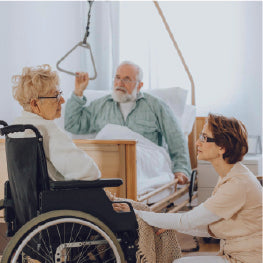
Less Prone to Outside Illnesses
Older people are more prone to illness. And because illness passes from person to person, assisted living tends to be a breeding ground.
This was highly prevalent when during the 2020 COVID-19 pandemic. Nursing homes suddenly became war zones as the disease spread rampantly. At one point, 21% of all US COVID-19 deaths were among nursing home residents (totaling 634,179). And the CDC found nursing home residents had a death rate 23 times higher than non-nursing home residents aged 65+.
Safety became a crucial aging in place benefit as seniors were much less likely to contract COVID in their homes. And while COVID-19 is less prevalent, nursing homes are still prone to disease outbreaks due to the number of people sharing a space.
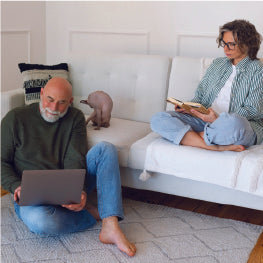
Independence and Privacy
Whereas a deterrent to aging in place is the potential isolation it can create, the flip side is the independence and privacy it brings. Both of which most seniors grow accustomed to.
40% say independence is the biggest reason they want to age at home. Independence and privacy are core aspects of what it means to be an adult, to do what we want when we want. The autonomy and self-reliance aging in place offers is a key driving factor that alternatives typically don’t offer.
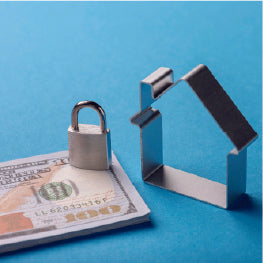
Wealth and Asset Preservation
Homeownership is one of the most prominent ways Americans build wealth. AARP reports that 80% of homeowners 65+ own their homes outright and hold an average of $292,300 in equity. Holding on to that equity gives seniors buying power should they need it.
Additionally, it removes the financial stress of relocation costs, including new leases, downsizing sales, moving trucks, movers, and more. Staying in one’s home removes the often fluctuating costs and provides a more predictable financial status.

Community Engagement
Being involved in one’s local community is a crucial driver for aging in place. And for good reason. ArchWell Health reports that active community participation amongst older adults is linked to reduced risk of:
- Depression
- Anxiety
- Heart disease
- And high blood pressure.
The social activities that a community provides give seniors the needed engagement and meaningful interactions to lead a healthy and fulfilling life. Over time, seniors have developed relationships and ties within their community that bring meaning to their lives.
To reverberate the key drawbacks and benefits of elderly living at home, resort to this chart:
| Pros | Cons |
|---|---|
| - Comfort and familiarity with one’s living space - Having the convenience of possessions, knowing where they are - Cheaper and more personalized home healthcare - More affordable costs Less prone to outside illnesses and disease Independence and privacy - Keeping your home preserves wealth and assets - Maintaining the community relationship and ties one has built over time | Uncertainty about stability should a financial, physical, or emotional health crisis occur - The challenges increased health risks bring while being alone - Social isolation from friends and family - Costs of home modifications and maintenance - The physical demand for home maintenance - The costs of home healthcare services - The burden placed on family caregivers |
Five Key Things to Consider Before Aging in Place
Now, you have a solid understanding of the pros and cons of aging in place. The next step is to decide whether or not it’s a suitable option for you or your loved one. To help make this decision easier, consider these five things:
1. Can You Afford to Age in Place?
Determining whether or not you can afford to age in place is the first thing you should do. Gather information such as your income and expenses, cost of needed home care services, potential home modifications, and any other expenses that may accrue while aging in place.
You’ll then need to gather alternative living costs, such as assistive living and nursing homes. While aging in place is typically more affordable, there are instances where it’s not. This can be due to the cost of needed home modifications, extensive in-home care, and even the home's physical location.
2. What is Your Current Health Status? Are You at Risk of Future Health Issues?
Aging in place requires some level of self-sufficiency if you’re living alone. Because of this, it’s essential to consider your current and potential future health status. If you have a health condition:
- Does it impede your ability to be self-sufficient? If so, do you have someone who can assist?
- Will it worsen as you age? If so, can you remain independent or find a caregiver to assist?
- What home modifications do you need to make to alleviate the limitations it creates? Will those modifications remain helpful as you age?
Regarding home modifications, it’s vital to consider your needs carefully. The last thing you want to do is spend the money to make those changes and still end up in assisted living.
3. What Home Care and Modifications are Required?
The downside of aging in place is keeping up with home care. And studies have found this to be a challenge for those aging in place. The physical demands of home care can be burdensome for older adults. Because of this, consider your home's needs regarding upkeep and maintenance. Are you able to meet those demands or hire someone who can?
Home modifications are another aspect to consider. What changes must you make to make your home safe and comfortable to age in? Keep in mind only 10% of US homes are considered aging-friendly. And sometimes the changes required may not be worth the hassle.
4. Can You Drive Safely?
A common hindrance with old age is driver safety. Studies have found seniors to be a greater safety risk when driving. Depleted vision, cognitive functioning, and physical ability strains driving ability. Are you able to safely drive? If not, do you have alternative modes of transportation available?
5. Are you at Risk of Social Isolation?
As mentioned prior, aging in place can lead to social isolation. More privacy means you aren’t around as many people. This can create feelings of depression and anxiety in seniors. Because of this, it’s essential to consider if you’re at risk of social isolation. And if so, do you have outlets to engage socially?
To Age in Place or Not Age in Place? That is the Question.
To make the best decision, it is vital to have a comprehensive understanding of the advantages and disadvantages.
Although there are drawbacks such as uncertainty about stability, increased health risks due to aging, social isolation, home modifications and maintenance, and the burden on caregivers, there are also benefits such as comfort and familiarity, the convenience of personal belongings, cheaper and customized care, affordability, and reduced susceptibility to external illnesses.
Ultimately, choosing to age in place is a personal decision, and weighing the pros and cons is essential to make an informed choice.
Related Resources
About the Author

Brandon Landgraf is the Digital Marketing Manager for Carex Health Brands. He finds passion and fulfillment in creating content that enhances, improves, and enlivens others' quality of life. All of his written work is formulated to not only offer essential advice and tips but back it with proven studies and experts. His mission is to connect with readers and provide steps to make their lives better.
You can connect with him on LinkedIn here.
About Carex Health Brands
Carex is your one-stop shop for home medical equipment and for products that assist caregivers with providing the best possible support and care for their loved ones. Carex Health Brands has been the branded leader in in-home, self-care medical products for over 35 years. Our goal is to improve the lives of our customers by bring them quality products that bring dignity back to their lives. With our three nationally distributed brands, Carex Health Brands serves national, regional and independent food, drug and mass retailers along with wholesalers, distributors and medical dealers.

